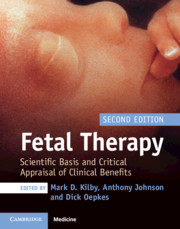Book contents
- Fetal Therapy
- Fetal Therapy
- Copyright page
- Dedication
- Contents
- Contributors
- Foreword
- Section 1: General Principles
- Chapter 1 The Rationale for Fetal Therapy
- Chapter 2 A Fetal Origin of Adult Disease
- Chapter 3 Human Embryology: Molecular Mechanisms of Embryonic Disease
- Chapter 4 Human Genetics and Fetal Disease: Assessment of the Fetal Genome
- Chapter 5 Interventions in Pregnancy to Reduce Risk of Stillbirth
- Chapter 6 Fetal Therapy Choices: Uncertain and Emotional Decisions and the Doctor’s Role in Parental Decision-Making
- Chapter 7 The Ethics of Consent for Fetal Therapy
- Chapter 8 Open Fetal Surgery: Is There Still a Role?
- Chapter 9 The Artificial Womb
- Section 2: Fetal Disease: Pathogenesis and Treatment
- Section III: The Future
- Index
- References
Chapter 7 - The Ethics of Consent for Fetal Therapy
from Section 1: - General Principles
Published online by Cambridge University Press: 21 October 2019
- Fetal Therapy
- Fetal Therapy
- Copyright page
- Dedication
- Contents
- Contributors
- Foreword
- Section 1: General Principles
- Chapter 1 The Rationale for Fetal Therapy
- Chapter 2 A Fetal Origin of Adult Disease
- Chapter 3 Human Embryology: Molecular Mechanisms of Embryonic Disease
- Chapter 4 Human Genetics and Fetal Disease: Assessment of the Fetal Genome
- Chapter 5 Interventions in Pregnancy to Reduce Risk of Stillbirth
- Chapter 6 Fetal Therapy Choices: Uncertain and Emotional Decisions and the Doctor’s Role in Parental Decision-Making
- Chapter 7 The Ethics of Consent for Fetal Therapy
- Chapter 8 Open Fetal Surgery: Is There Still a Role?
- Chapter 9 The Artificial Womb
- Section 2: Fetal Disease: Pathogenesis and Treatment
- Section III: The Future
- Index
- References
Summary
In this chapter, we will discuss the ethics of consent for fetal therapy. The latter term refers to a very broad field, ranging from open surgery to pharmacotherapy, from experimental procedures to accepted treatment, and from interventions aimed at saving fetuses from in utero or perinatal death to treatments with a rationale of improving long-term health outcomes. Because the fetus can only be treated via the body of the pregnant woman, fetal therapy is always a form of ‘maternal-fetal medicine’ and cannot be performed without her informed consent (or that of her representative). However, what makes informed consent for fetal therapy special is that, unlike in other medical contexts, the consenting (or non-consenting) person not only decides for herself, but also for the fetus who may or may not survive and/or for the future child who may or may not benefit. As a consequence, consent for fetal therapy is inevitably asked and given in the context of ideas about the responsibility of the pregnant woman as an expectant mother, a responsibility that, rightly or wrongly, is either assumed by her from within or ascribed to her from without.
- Type
- Chapter
- Information
- Fetal TherapyScientific Basis and Critical Appraisal of Clinical Benefits, pp. 69 - 76Publisher: Cambridge University PressPrint publication year: 2020



